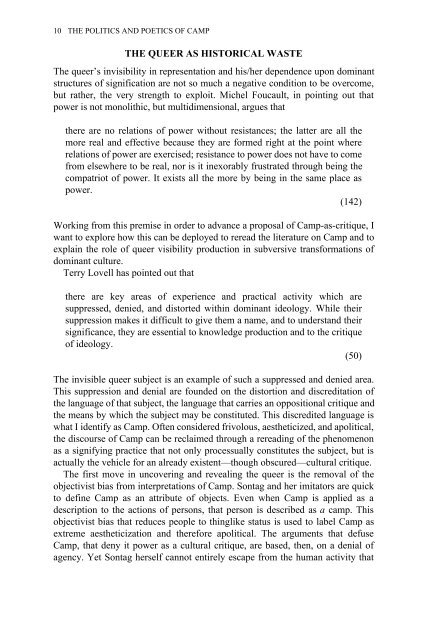Edited by Moe Meyer - Get a Free Blog
Edited by Moe Meyer - Get a Free Blog
Edited by Moe Meyer - Get a Free Blog
Create successful ePaper yourself
Turn your PDF publications into a flip-book with our unique Google optimized e-Paper software.
10 THE POLITICS AND POETICS OF CAMP<br />
THE QUEER AS HISTORICAL WASTE<br />
The queer’s invisibility in representation and his/her dependence upon dominant<br />
structures of signification are not so much a negative condition to be overcome,<br />
but rather, the very strength to exploit. Michel Foucault, in pointing out that<br />
power is not monolithic, but multidimensional, argues that<br />
there are no relations of power without resistances; the latter are all the<br />
more real and effective because they are formed right at the point where<br />
relations of power are exercised; resistance to power does not have to come<br />
from elsewhere to be real, nor is it inexorably frustrated through being the<br />
compatriot of power. It exists all the more <strong>by</strong> being in the same place as<br />
power.<br />
(142)<br />
Working from this premise in order to advance a proposal of Camp-as-critique, I<br />
want to explore how this can be deployed to reread the literature on Camp and to<br />
explain the role of queer visibility production in subversive transformations of<br />
dominant culture.<br />
Terry Lovell has pointed out that<br />
there are key areas of experience and practical activity which are<br />
suppressed, denied, and distorted within dominant ideology. While their<br />
suppression makes it difficult to give them a name, and to understand their<br />
significance, they are essential to knowledge production and to the critique<br />
of ideology.<br />
(50)<br />
The invisible queer subject is an example of such a suppressed and denied area.<br />
This suppression and denial are founded on the distortion and discreditation of<br />
the language of that subject, the language that carries an oppositional critique and<br />
the means <strong>by</strong> which the subject may be constituted. This discredited language is<br />
what I identify as Camp. Often considered frivolous, aestheticized, and apolitical,<br />
the discourse of Camp can be reclaimed through a rereading of the phenomenon<br />
as a signifying practice that not only processually constitutes the subject, but is<br />
actually the vehicle for an already existent—though obscured—cultural critique.<br />
The first move in uncovering and revealing the queer is the removal of the<br />
objectivist bias from interpretations of Camp. Sontag and her imitators are quick<br />
to define Camp as an attribute of objects. Even when Camp is applied as a<br />
description to the actions of persons, that person is described as a camp. This<br />
objectivist bias that reduces people to thinglike status is used to label Camp as<br />
extreme aestheticization and therefore apolitical. The arguments that defuse<br />
Camp, that deny it power as a cultural critique, are based, then, on a denial of<br />
agency. Yet Sontag herself cannot entirely escape from the human activity that


